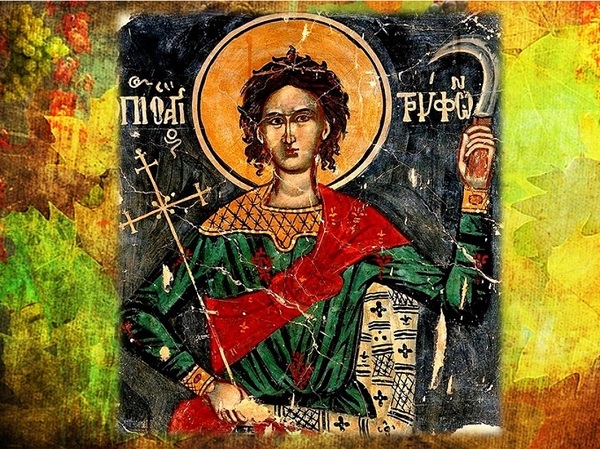Winter holidays in Bulgaria. February 14 - Trifon Zarezan. The day for everyone who is in love... with wine

Why is this holiday called “Trifon Zarezan”? History of origin, legends and traditions. What do bulgarians eat and drink on this day in Bulgaria?
Every year, on February 14, a good half of the world cuts hearts out of paper and buys chocolates as gifts for their lovers. But in the Balkan countries and, of course, in Bulgaria, this date is considered to be the professional holiday of winegrowers, winemakers and owners of all places where guests are served wine. On this day, it is customary to thank and praise St. Trifon, the patron saint of the vine, which brings well-being to all the professions listed above.
Officially, according to the new calendar, the church in Bulgaria celebrates Trifonovden every year on February 1. Nevertheless, the tradition to celebrate February 14 (February 1 in old style) has remained since the dawn of winemaking in Bulgaria, and this date is firmly entrenched in the folk calendar by the name of Trifon Zarezan (eng. Trifon Cut).
Why does Saint Trifon have such a strange nickname? According to the legend of the southern Slavs, Trifon was the brother of the Virgin. Once she cursed him for insulting her and the baby on her way to church. As a sign of repentance, Trifon cut off his nose. But there is another story: Trifon began to be called Zarezan when, while being drunk and cutting the vine, he accidentally cut his own nose. Therefore, the saint has another nickname - Trifon the Drunkard.
Following the old traditions, on this day - February 14 - the winegrowers begin spring pruning of the vine. This process is usually accompanied by special rites, the execution of which is intended to ensure a rich grape harvest.
A woman’s duty on this day is to prepare food for the grower who goes pruning the vine. In the morning, the winemakers' wives should equip their husbands with food and drinks: chicken stuffed with rice or bulgur, wheat flatbread decorated with dough grape leaves, dry sausages and pickles, an obligatory bottle of wine or rakia. A man cleans and sharpens the knife with which the vine will be cut.
Vine pruning is considered a purely masculine job and women are not allowed to the rite. In the morning, men gather in the vineyard, cut off the grape shoots, pour it with wine, sprinkle holy water, say ritual words. Then a common meal is organized. During the meal, “the king of the vine" is chosen - usually it’s the most experienced grower. A crown of grapevine is placed on his head. At the end of the feast, the “king” is seated in a car, on a cart or even picked up and carried to the nearest village or city, accompanied by musicians with folk instruments. The procession stops in front of each house, the housewife of which must endure a large vessel with wine - to treat the "king" and his retinue, and pour the rest of the wine on the "king" with wishes of well-being and good harvest. The holiday ends with a big universal feast and horo dances (round or line folk dance) in which women also take part.

If you are in Bulgaria in the winter - don’t miss this fun folk festival. Every year on this day in Bulgaria, wine flows like water in the name of St. Trifon the Drunkard, so that next year there will be even more wine. Numerous wineries in Bulgaria invite those who wish to take part in the festive ceremonies. In cities, restaurants, wine bars, mehanas organize special wine parties. In Bulgaria February 14 is considered the Day of love and wine - a successful combination of two holidays - the romantic one and the folk one. If you are in love and love wine - this holiday is for you!
Read also:
 Where are the best wineries in Bulgaria and what kind of wine do they make
Where are the best wineries in Bulgaria and what kind of wine do they make
 Ordering fish dishes in the restaurants of Bulgaria - how to understand Bulgarian fish and seafood names?
Ordering fish dishes in the restaurants of Bulgaria - how to understand Bulgarian fish and seafood names?